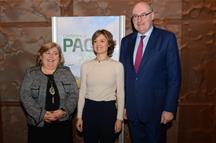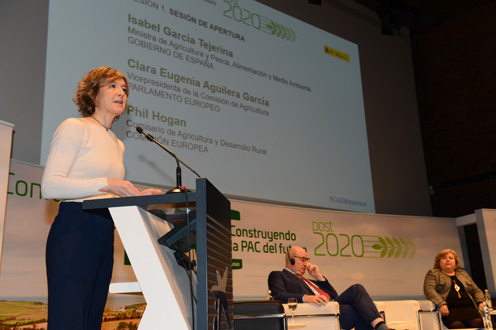Earlier on Monday, at the opening ceremony of the conference entitled "Building the CAP of the Future, post-2020"
"The CAP must remain a central pillar of the European agenda", says Isabel García Tejerina
News - 2017.3.27
Alongside the European Commissioner for Agriculture and Rural Development, Phil Hogan, and the Vice-President of the Committee on Agriculture and Rural Development of the European Parliament, Clara Aguilera, Isabel García Tejerina officially opened the conference entitled "Building the CAP of the Future, post-2020".
The Spanish minister believes that this conference is a good opportunity for comparing the various approaches being suggested to the future Common Agricultural Policy and should enable identification of the areas in which agreements can be reached, joint efforts can be made and alliances forged.
The CAP as an element of stability
In her speech, Isabel García Tejerina said that the CAP has stood at the heart of the European construction process since the outset, facilitating its consolidation and the creation of new common policies aimed at tackling the new demands from society.
She went on to add that, in Spain, the CAP has been the main element of stability and certainty that has enabled a sound agri-food sector to be consolidated and particularly allowed complex restructuring processes to be undertaken. The Spanish minister understands that this positive trend has enabled the Spanish agri-food sector to account for 10% of domestic GDP and provide jobs to over 2.3 million people, especially in the rural environment.
Furthermore, agri-food exports amounted to 46.8 billion euros in 2016, to which hundreds of thousands of small- and medium-sized farming and livestock operations contribute, as well as a significant number of companies in the rural environment.
Hence, Spanish agri-food products have gone beyond EU markets to successfully position themselves in major destinations around the world. In particular, Spain is the leading global producer of olive oil, the third-largest global producer of wine, the fourth-largest global exporter of pork meat, the sixth-largest global producer of fruits and vegetables, the fourth-largest global exporter of citrus fruits and the world leading exporter of fresh produce.
Hence, the CAP provides the stability needed for such an intrinsically variable activity as agriculture, forms the topsoil on which our agri-food sector is based and, to a significant degree, binds the socio-economic fabric of our rural environment. For this reason, the Spanish minister is convinced that more CAP will be needed in the decade to come.
Future of the CAP
 MAPAMAIn this regard, the Spanish minister stressed that the CAP not only represents the continued existence of numerous productions or a guaranteed income for farmers but also meets a series of demands that European society has placed upon it and to which the CAP has continually offered a response ever since it was created. For this reason, the Spanish minister believes more CAP is needed in the future.
MAPAMAIn this regard, the Spanish minister stressed that the CAP not only represents the continued existence of numerous productions or a guaranteed income for farmers but also meets a series of demands that European society has placed upon it and to which the CAP has continually offered a response ever since it was created. For this reason, the Spanish minister believes more CAP is needed in the future.
Furthermore, the CAP must continue to follow the market-orientated path it set out on during the 1990s. Isabel García Tejerina believes that, when crop and livestock farmers are more aware of market trends, they are capable of more swiftly responding to changing situations. For this reason, there is a need for instruments to be strengthened; especially those aimed at combating increasing market volatility. Specifically, the minister suggested that the security network should have a more preventive nature regarding crisis situations.
In order to tackle the problem of rural depopulation, Isabel García Tejerina highlighted the importance of incorporating the principles of the Cork 2.0 Declaration into the future CAP so that, in coordination with other European funds and instruments, the rural environment can offer living and employment opportunities to young people and women in particular.
Multiannual financial framework
Furthermore, Isabel García Tejerina referred to the challenges and uncertainties facing the European Union in the near future, such as the withdrawal of the United Kingdom from the European Union or the negotiation of the new Multiannual Financial Framework.
In this regard, the Spanish minister believes it is essential to achieve adequate funding for the CAP, given that it would be highly difficult otherwise to meet the objectives being sought.
At any event, Isabel García Tejerina explained that the time has come to identify shared approaches and common ground so that the Spanish position in Brussels can be as sound and complete as possible in the interest of Spanish crop and livestock farmers and, in short, the whole of Spanish society.





